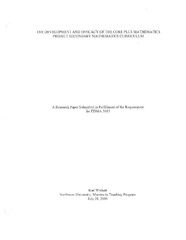| dc.description.abstract | By the early 1980s it was clear that the education of students in the United States was falling behind most other developed countries especially in math and science. This resulted in a significant shift from the “traditional” mathematics teaching methods of rote procedure and practice to “reformed” methods which encouraged students to discover mathematical concepts using investigation and collaboration. Out of this reform movement arose the Core-Plus Mathematics Project (CPMP) curriculum, which has since become the most widely used reform curriculum in the United States. Because the reform philosophy represents a significant change from traditional Mathematics education, it was perhaps inevitable that reform methods in general, and the CPMP in particular would spark controversy between educators, researchers, parent groups, school districts, and governmental agencies. This has become so much the case that the reform and traditional camps now both seem willing to let the education of students become a second priority to winning the “math war.” This research paper uses historical methods to ask “does the data support the claim that the CPMP curriculum is more effective than traditional mathematics curricula?” It uses historical documents to consider the forces that gave rise to the reform mathematics philosophy and the creation of the CPMP. It describes the key features of the CPMP which differ from traditional curricula and summarizes the research which has sought to evaluate its effectiveness. Ultimately the research seems to indicate that both proponents and critics of reform curriculum have valid points, but that both are guilty of selective data analysis and exaggeration to make their claims. The data seems to me to show that while the CPMP shows good promise as an effective mathematics curriculum, its promise is being overshadowed by extremists on both sides of the debate who cling to their philosophical positions so tightly that neither will consider the valid arguments made by the other. Sadly, the casualties in this battle are students – who are receiving a less effective mathematics education than they should. | en |


 Maintained by the Northwest University Library
Maintained by the Northwest University Library